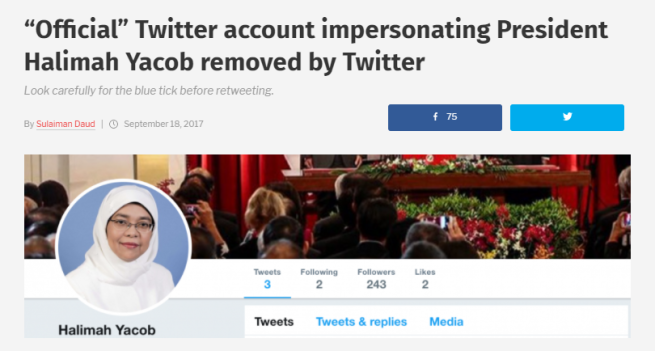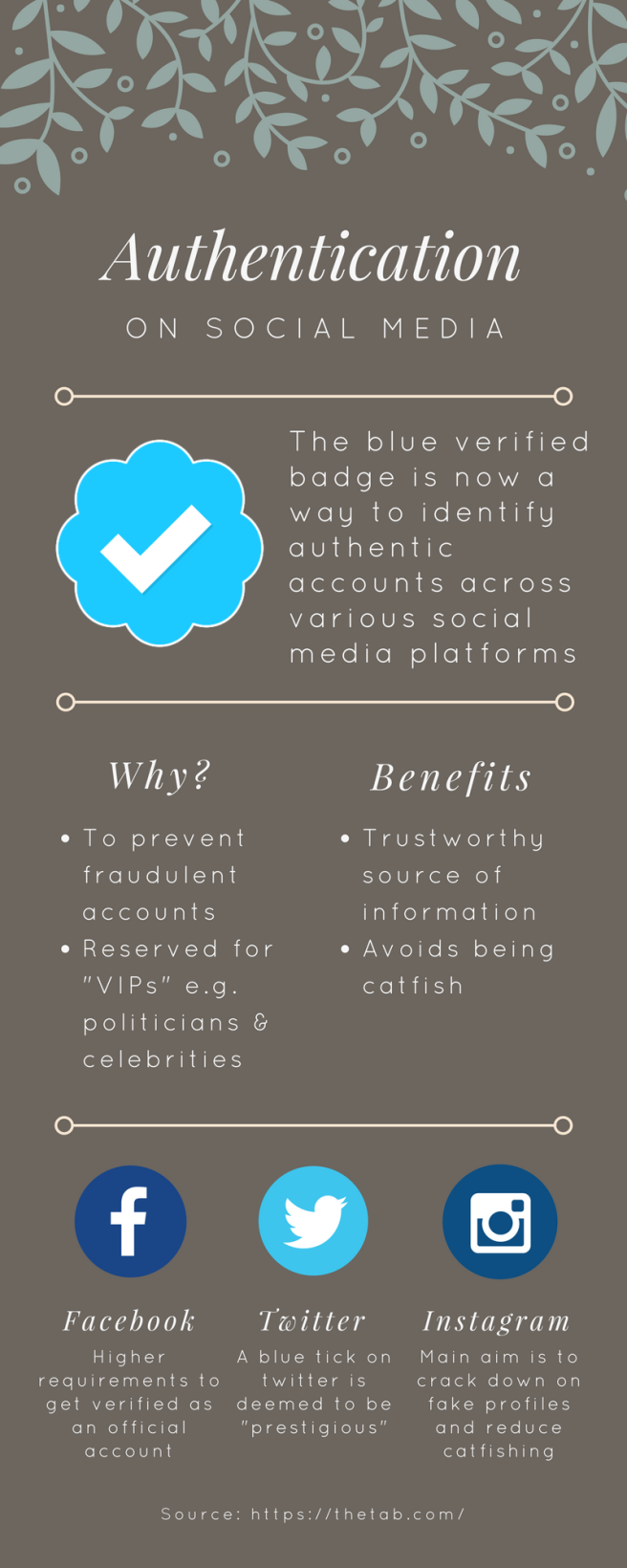Today, we will be discussing on how to properly assess whether a piece of online information is authentic and reliable.
Media Literacy
is a 21st century approach to education and a framework to assess, analyse, evaluate and communicate messages in a variety of forms.
(Center for media literacy, 2017)
Echo Chamber & Filter Bubbles
(CNNMoney, 2016)
As mentioned in the video, an echo chamber is a phenomenon where people tend to mix around with like-minded people, there is little to no disagreement or alternating views about a topic. However, what’s worst is the filter bubble. In an interview with Quartz, Bill Gates said:
Technology such as social media lets you go off with like-minded people, so you’re not mixing and sharing and understanding other points of view. It’s super important. It’s turned out to be more of a problem than I, or many others, would have expected.
(Bill Gates, 2017)
So, how do you get out of a filter bubble?
(BBC Trending, 2017)
Fake News Sites

(Screenshot of The Onion, 2017)
There is a growing number of sites like The Onion who publishes fake news on the internet. With Facebook’s publicity, these sites went viral at an alarming rate (BuzzFeed News, 2016). Below are some of the top US election stories from fake and mainstream media.
(BuzzFeed News, 2016)
These sites are often misleading and unreliable, so what can we do to spot fake news?

(IFLA, 2017)
Fake Accounts

(Mothership, 2017)

(Self produced, 2017)
Data Literacy
Data literacy is the ability to derive meaningful information from data, just as literacy in general is the ability to derive information from the written word.
(Rouse & Wigmore, 2015)
So what can be done to improve data literacy?

(Self produced, 2017)
Easel.ly suggest the use of infographics to represent data in a fun and interesting way. You may go to Daily Infographic for great examples.

(Self produced, 2017)
Word Count: 300
References
BBC Trending. (2017, June 3). How can you burst your filter bubble? – BBC Trending. Retrieved from YouTube: https://www.youtube.com/watch?v=mh1dLvGe06Y?rel=0&w=560&h=315
Center for media literacy. (2017, November 15). Media Literacy: A Definition and More. Retrieved from Medialit: http://www.medialit.org/media-literacy-definition-and-more
CNNMoney. (2016, December 19). How social media filter bubbles work. Retrieved from YouTube: https://www.youtube.com/watch?v=doWZHFnVPQ8?rel=0&w=560&h=315
Cummings, J. (2015, November 13). How to get a blue tick on Instagram, Tinder, Facebook and Twitter. Retrieved from The Tab: https://thetab.com/2015/11/13/verified-instagram-61845
Daily Infographic. (2017, November 15). Homepage. Retrieved from Daily Infographic: http://www.dailyinfographic.com/
Daud, S. (2017, September 18). “Official” Twitter account impersonating President Halimah Yacob removed by Twitter. Retrieved from Mothership: https://mothership.sg/2017/09/theres-a-fake-twitter-profile-of-halimah-yacob-around/
Delaney, K. J. (2017, February 21). Filter bubbles are a serious problem with news, says Bill Gates. Retrieved from Quartz: https://qz.com/913114/bill-gates-says-filter-bubbles-are-a-serious-problem-with-news/
Easel.ly. (2017, April 13). Blog: Improving Data Literacy in Schools. Retrieved from Easel.ly: https://easel.ly/blog/improving-data-literacy-schools/
Internation Federation of Library Association. (2017, November 15). How To Spot Fake News. Retrieved from IFLA: https://www.ifla.org/publications/node/11174
Rouse, M., & Wigmore, I. (2015, July). Definition: Data Literacy. Retrieved from TechTarget: http://whatis.techtarget.com/definition/data-literacy
Silverman, C. (2016, November 17). This Analysis Shows How Viral Fake Election News Stories Outperformed Real News On Facebook. Retrieved from BuzzFeed News: https://www.buzzfeed.com/craigsilverman/viral-fake-election-news-outperformed-real-news-on-facebook?utm_term=.uh4Doo00B#.xv6rvvxxL
The Onion. (2017, November 15). Homepage. Retrieved from The Onion: https://theonion.com/



Hi Min Hui, nice to see you again :)!
I love your summary infographic a lot as it provides such a comprehensive yet easily understood and well-organized key points regarding this topic such as ways to improve data literacy as well as how to spot fake news. Well done!!
Fortunately, we are aware of the danger of the prevalence of fake news, filter bubbles and echo chambers. However, i think filter bubbles and echo chambers “may” provide some sort of advantages in terms of expanding personal learning network as our usage of internet and social media is tailored to our particular preferences so it is easier for us to navigate the web and utilize it as a method to connect and communicate with those who share similar passions which in turn deepen our knowledge of a particular interest.
I’m considering their effects from an academic and personal interest viewpoint instead of a political view.
Do you share the same perspective as me? Looking forward to receiving your reply!
Here is the article that elaborates more on it in case you’re interested!
Looking forward to receiving your reply!
LikeLike
Hi Luna,
Thank you for writing to me once again and giving me another perspective on how filter bubbles can be advantageous to us in our learning. However, the article you’ve provided also states the disadvantages of not being able to gather information on similar topics outside the subject that you are passionate about. Thus, I feel it is important to not only look at subjects you are passionate about but also on topics of similar interest, sometimes opposing views to get an all-rounded perspective on the subject.
Here are some examples of classical science theories that have been later debunked by modern science, hence suggesting the need to constantly question ourselves whether things are the way it was meant to be or can they to some extent be wrong.
LikeLike
Hi Min Hui,
Your post has taught me the importance of properly assessing online information, and how echo chambers and filter bubbles may play a part in how people look at the data provided which is helpful.
You also provided ways to spot fake news – One of the ways would be checking on the authentication of these platforms if they are verified. Certainly, verified accounts (especially politicians) would be presenting authentic news. However, Singapore Press Holdings (SPH) is closely supervised by political leadership and the media is controlled in a way where there is high censorship and will be vetted through before publishing. If they do not comply to requirements, their license would be revoked. In a way, the media is presenting news in a certain way which would engineer the thoughts of the public to how the government wants it to be which questions the reliability of verified accounts. Research shows that 54% of Singaporeans are neutral or distrusting towards what is put online.
What are your views on this?
(163 words)
REFERENCES
http://www.freedomfromthepress.info/resources.html
http://www.straitstimes.com/singapore/media-must-be-credible-balanced-and-objective-pm-lee
https://www.edelman.com/global-results/
LikeLike
Hi Denise,
Thank you for taking the time to write to me. I have went through the reference links you have attached due to the controversy of the topic mentioned. Also, I wanted to try applying what I have learned these few days using the examples provided.
To my surprise, the author for ‘Freedom from the press’ was actually an ex journalism professor Cherian George, at the Nanyang Technological University of Singapore (NTU) who got his tenure application rejected in 2009 for accusing the school of curtailing academic freedom. He now resides in Hong Kong as a professor in media studies but still actively engages himself in the topic of journalism freedom in Singapore.
Also, some of the sources that I have found are linked to the initial post by ‘Freedom from the press’ and are actually one-sided or biased in that sense. Furthermore, there are no ‘official’ evidence to prove that the Singapore government are indeed controlling the media. Thus, I would say that although these sources provided facts and figures suggesting the strict media control in Singapore, they might have a personal or political agenda fixated. Only the authors themselves knows the truth as to why there is a need to address these issues and their gain in doing so.
In conclusion, it all depends upon individual judgement of the situation to deem whether or not to trust a source, regardless of digital or printed media.
LikeLike